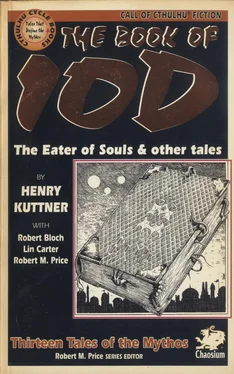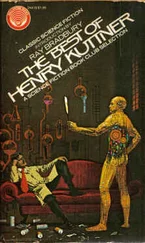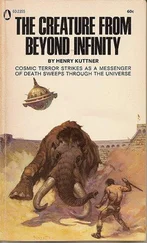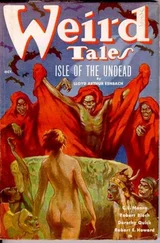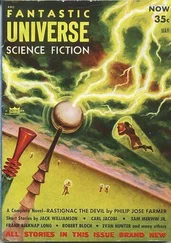Henry Kuttner - The Book of Iod
Здесь есть возможность читать онлайн «Henry Kuttner - The Book of Iod» весь текст электронной книги совершенно бесплатно (целиком полную версию без сокращений). В некоторых случаях можно слушать аудио, скачать через торрент в формате fb2 и присутствует краткое содержание. Год выпуска: 1995, ISBN: 1995, Издательство: Chaosium, Жанр: Ужасы и Мистика, на английском языке. Описание произведения, (предисловие) а так же отзывы посетителей доступны на портале библиотеки ЛибКат.
- Название:The Book of Iod
- Автор:
- Издательство:Chaosium
- Жанр:
- Год:1995
- ISBN:9781568820453
- Рейтинг книги:5 / 5. Голосов: 1
-
Избранное:Добавить в избранное
- Отзывы:
-
Ваша оценка:
- 100
- 1
- 2
- 3
- 4
- 5
The Book of Iod: краткое содержание, описание и аннотация
Предлагаем к чтению аннотацию, описание, краткое содержание или предисловие (зависит от того, что написал сам автор книги «The Book of Iod»). Если вы не нашли необходимую информацию о книге — напишите в комментариях, мы постараемся отыскать её.
The Book of Iod — читать онлайн бесплатно полную книгу (весь текст) целиком
Ниже представлен текст книги, разбитый по страницам. Система сохранения места последней прочитанной страницы, позволяет с удобством читать онлайн бесплатно книгу «The Book of Iod», без необходимости каждый раз заново искать на чём Вы остановились. Поставьте закладку, и сможете в любой момент перейти на страницу, на которой закончили чтение.
Интервал:
Закладка:
THE BOOK OF IOD
by Henry Kuttner
with Robert Bloch, Lin Carter and Robert M. Price
Dedicated to the memory of
KARL EDWARD WAGNER,
Knight of Carcosa
Introduction
The Khut-N’hah Mythos
A few years ago, if one were writing an introduction like this, one would have had to say that we are focusing on the early, neglected period of a writer who is far better known for his mature work in the fields of fantasy and science fiction. Now we cannot say precisely this, as Henry Kuttner’s star shines neither so brightly no so high up in the firmament as it once did. Even Ray Bradbury’s memoir of his friend and mentor in The Best of Henry Kuttner is called “A Neglected Master”, and that was some twenty years ago. Today it is sad but safe to say that just about all of Kuttner’s exceedingly clever fiction is the property of literary nostalgia-lovers and antiquarians. All of it has passed into the category of literary curiosities. And yet the distinction between apprentice and journeyman work is worth preserving. The Cthulhu Mythos specialist is most interested in the Lovecraftian juvenilia of Henry Kuttner.
Henry Kuttner (1914-1958) was a friend of the young Robert Bloch and, like him, a writer just starting out. Both shared the same markets, including Weird Tales and Strange Stories . They even collaborated on a few stories. Another thing both shared was a literary friendship with the Great Old One, er, Grand Old Man, H. P. Lovecraft. Probably Bloch assured Kuttner that the Providence recluse was actually quite approachable and suggested he write him. Kuttner soon became one of the Lovecraft Circle, submitting plot ideas and draft manuscripts to Lovecraft for evaluation, albeit over the brief space of a single year (February 1936 to February 1937) before Lovecraft’s death.
Critic Edmund Wilson once dismissed the juvenile “Lovecraft cult” in much the same spirit as Athens dismissed Socrates as a corrupter of the city’s youth. Lovecraft encouraged a whole stable of young disciples including Bloch, Kuttner, August Derleth, Duane Rimel, Richard F. Searight, Willis Conover, and (posthumously) Ramsey Campbell, Brian Lumley, Gary Myers, and others. Many of these young men started out thinking that what they wanted to do was to write like Lovecraft, but what they eventually decided they wanted was to become writers, period. What Bradbury says of Kuttner, “He did not really want to become a minor-league Lovecraft”, was equally true of these others. Most made it and finally found their own voices, major league or minor. Kuttner certainly became, in his era, a major voice. This was after he had put away the childish things of Lovecraftian pastiche. But these are the things, perhaps perversely, that interest you and me. We want to take a closer look at Kuttner’s early Cthulhu Mythos fiction. Indeed, it is good not to pass it by too quickly, for, not only are several of the tales quite enjoyable in their own right, they contain a number of fascinating details that repay study.
The element of Lovecraft that seems to grab many pasticheurs is not so much the Old Gent’s style as it is his intriguing pseudo-mythology. It seems that every one who treads this path gladly yields to the temptation to complicate the Mythos a little bit more, expand the pantheon, add a few more tomes to the sagging shelf of imaginary grimoires. Our Kuttner was by no means immune. Let us occupy ourselves for a moment first with the sources and then with the shape of the Kuttner or (as HPL dubbed his disciple) Khut-N’hah Mythos.
Obviously the chief influence on Kuttner’s pseudo-Lovecraftiana is Lovecraft’s own work. After an initial experiment with Gothic horror (“The Secret of Kralitz”) Kuttner penned a pair of pastiches ofLovecraft’s Dunsanian tales. These are “The Jest of Droom Avista” and “The Eater of Souls.” Though he would reuse a couple of the names and concepts he coined for these stories, he soon abandoned this form and went on to do more “straight” horror stories set in the modern era. In these he makes passing references once or twice to the Lovecraftian names Yog-Sothoth, Cthulhu, Yuggoth and Yig. But these were strictly marginal and might have been as easily pruned as were the Mythos references in the first draft of Fritz Leiber’s “Adept’s Gambit.”
Equally important was the influence of Kuttner’s friend Robert Bloch. Several of Kuttner’s stories for Weird Tales and Strange Stories read much like Bloch’s work of the same period, mixing snappy, crisp narration (reminiscent of 1940’s movie scripts) with the horrors of medieval diabolism—and a wry sense of the incongruity involved. Even in terms of Mythos props, it is significant to note that Kuttner usually eschews Lovecraft’s already hackneyed Necronomicon, preferring instead Bloch’s Mysteries of the Worm/De Vermis Mysteriis . And the name given to Kuttner’s Keziah Mason clone in “The Salem Horror”, Abigail Prinn, is obviously a salute to Bloch’s Flemish wizard Ludvig Prinn.
The thing that made Lovecraft’s esoteric lore effective was the impression he gave that it might reflect a genuine ancient tradition. To this end he took care to cast his names like “Yuggoth”, “shoggoths”, “Yog-Sothoth”, “Azathoth”, etc., in the linguistic accents of Hebrew and Arabic, the languages of much medieval and ancient magical literature. “Nug and Yeb” were meant to have a Tartar or Tibetan ring. This kind of piggy-backing on genuine ancient lore was a trick not lost on Kuttner. He proceeded to camouflage his own mythologoumena with references borrowed from ancient religion. His favorite source (perhaps because Lovecraft had not used it) was Persian Zoroastrianism. This is plain in his story, not included here, “Towers of Death” ( Weird Tales , November 1939), where we do not meet with any of the familiar Mythos spooks, but we do have a character making a deal with the Zoroastrian anti-god Ahriman. Some of the overt Mythos tales (all of which are included here) make sidelong or disguised references to Zoroastrianism, as we will see in the introductions to particular stories.
Lovecraft was much taken with the lore of Theosophy once his pal Edgar Hoffmann Price introduced him to it. Madame Blavatsky’s erudite yet crackpot volumes Isis Unveiled and The Secret Doctrine were a gold mine of esoterica for fantasy writers of the pulp era. In his fascinating article “John Carter: Sword of Theosophy” (available in the Mirage Press collection of Amra reprints The Conan Swordbook ), Fritz Leiber shows in convincing detail how several major building blocks of Edgar Rice Burroughs’ Barsoom books were lifted directly from the pages of Madame Blavatsky. In his introduction to Poseidonis , one of his Clark Ashton Smith collections, Lin Carter suggests a similar dependence of Smith on Blavatsky, and it is Carter who rightly notes that “Madame Blavatsky is really quite an important person in the history of fantasy. In the course of [her] two interminable and all but unreadable tomes of spurious occult lore… she codified fugitive and unattached morsels of legend, theory, and nonsense into a systematic prehistory of the world… This system, percolating down through sensational popularizations and Sunday supplement articles, was adopted lock, stock, and barrel by writers for the fantasy pulp magazines, who are thus greatly in her debt.”
Perhaps it seemed natural for pulp writers to incorporate the lore of Blavatskianism, since she herself might be viewed as having done just what they were doing: using genuine mystical and mythic lore as an anchor to provide false gravity for her own innovations with which she mixed them.
Читать дальшеИнтервал:
Закладка:
Похожие книги на «The Book of Iod»
Представляем Вашему вниманию похожие книги на «The Book of Iod» списком для выбора. Мы отобрали схожую по названию и смыслу литературу в надежде предоставить читателям больше вариантов отыскать новые, интересные, ещё непрочитанные произведения.
Обсуждение, отзывы о книге «The Book of Iod» и просто собственные мнения читателей. Оставьте ваши комментарии, напишите, что Вы думаете о произведении, его смысле или главных героях. Укажите что конкретно понравилось, а что нет, и почему Вы так считаете.
